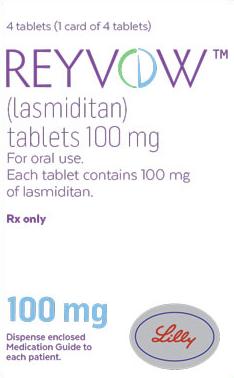Lasmiditan Side Effects
Applies to lasmiditan: oral tablet.
Serious side effects of Lasmiditan
Along with its needed effects, lasmiditan may cause some unwanted effects. Although not all of these side effects may occur, if they do occur they may need medical attention.
Check with your doctor immediately if any of the following side effects occur while taking lasmiditan:
More common
- Dizziness
- drowsiness
- relaxed and calm
- sleepiness
Less common
- Irregular heartbeat
- trouble breathing
Rare
- Fast heartbeat
- fever
- hives, itching, rash
- hoarseness
- irritation
- joint pain, stiffness or swelling
- redness of the skin
- swelling of the eyelids, face, lips, hands, or feet
- tightness in the chest
- troubled swallowing
Incidence not known
- Anxiety
- confusion
- diarrhea
- difficulty sleeping
- disorientation
- drowsiness to profound coma
- dry mouth
- fever
- headache
- hyperventilation
- irritability
- lightheadedness
- nervousness
- overactive reflexes
- poor coordination
- restlessness
- seeing, hearing, or feeling things that are not there
- shivering
- sweating
- talking or acting with excitement you cannot control
- trembling or shaking
- twitching
- unusual drowsiness, dullness, tiredness, weakness or feeling of sluggishness
- unusual tiredness or weakness
Other side effects of Lasmiditan
Some side effects of lasmiditan may occur that usually do not need medical attention. These side effects may go away during treatment as your body adjusts to the medicine. Also, your health care professional may be able to tell you about ways to prevent or reduce some of these side effects.
Check with your health care professional if any of the following side effects continue or are bothersome or if you have any questions about them:
More common
- Burning, crawling, itching, numbness, prickling, "pins and needles", or tingling feelings
Less common
- False or unusual sense of well-being
- feeling of constant movement of self or surroundings
- muscle spasm
- sensation of spinning
- trouble seeing
For Healthcare Professionals
Applies to lasmiditan: oral tablet.
General
The most commonly reported adverse reactions have included dizziness, fatigue, paresthesia, and sedation.[Ref]
Nervous system
Very common (10% or more): Dizziness (up to 17%)
Common (1% to 10%): Sedation (includes somnolence), paresthesia (includes oral paresthesia, oral hypoesthesia, and hypoesthesia)
Frequency not reported: Vertigo, incoordination, lethargy, tremor, cognitive changes, speech abnormalities, impaired driving performance, serotonin syndrome
Vertigo, incoordination, lethargy, tremor, cognitive changes, and speech abnormalities were reported in less than 2% of patients receiving this drug, but more frequently than those receiving placebo.
In a clinical study evaluating driving performance 90 minutes after administration of this drug, a dose-dependent impairment of computer-based simulated driving performance was observed.
Hypersensitivity
Uncommon (0.1% to 1%): Hypersensitivity including angioedema, rash and photosensitivity
Cardiovascular
Frequency not reported: Chest discomfort, palpitations, heart rate decreases, increased blood pressure
Chest discomfort and palpitations were reported in less than 2% of patients receiving this drug, but more frequently than those receiving placebo. A mean decrease in heart rate of 5 to 10 beats per minute was observed in patients receiving this drug, while a mean decrease of 2 to 5 beats per minute was observed in placebo patients. Blood pressure increases of 2 to 3 mmHg were observed in patients receiving 200 mg of this drug compared to a mean increase of up to 1 mmHg in placebo patients. In healthy patients over 65 years, a mean increase of 7 mmHg was observed in patients receiving this drug compared with 4 mmHg in placebo patients. By 2 hours, no difference in blood pressure compared to placebo were found. This drug has not been well studied in patients with ischemic heart disease.
Respiratory
Frequency not reported: Dyspnea
Dyspnea was reported in less than 2% of patients receiving this drug, but more frequently than those receiving placebo.
Ocular
Frequency not reported: Visual impairment
Visual impairment was reported in less than 2% of patients receiving this drug, but more frequently than those receiving placebo.
Other
Common (1% to 10%): Fatigue (includes asthenia and malaise)
Gastrointestinal
Common (1% to 10%): Nausea and/or vomiting
Musculoskeletal
Common (1% to 10%): Muscle weakness
Frequency not reported: Muscle spasm, limb discomfort
Muscle spasm and limb discomfort were reported in less than 2% of patients receiving this drug, but more frequently than those receiving placebo.
Psychiatric
Frequency not reported: Feeling abnormal, anxiety, tremor, restlessness, sleep abnormalities including sleep disturbance and abnormal dreams, confusion, euphoric mood, hallucinations
Feeling abnormal, anxiety, tremor, restlessness, sleep abnormalities including sleep disturbance and abnormal dreams, confusion, euphoric mood, and hallucinations were reported in less than 2% of patients receiving this drug, but more frequently than those receiving placebo.
Frequently asked questions
More about lasmiditan
- Check interactions
- Compare alternatives
- Reviews (26)
- Dosage information
- During pregnancy
- Drug class: antimigraine agents
- Breastfeeding
- En español
Patient resources
Other brands
Professional resources
Other brands
Related treatment guides
References
1. Product Information. Reyvow (lasmiditan). Lilly, Eli and Company. 2019.
Further information
Always consult your healthcare provider to ensure the information displayed on this page applies to your personal circumstances.
Some side effects may not be reported. You may report them to the FDA.

